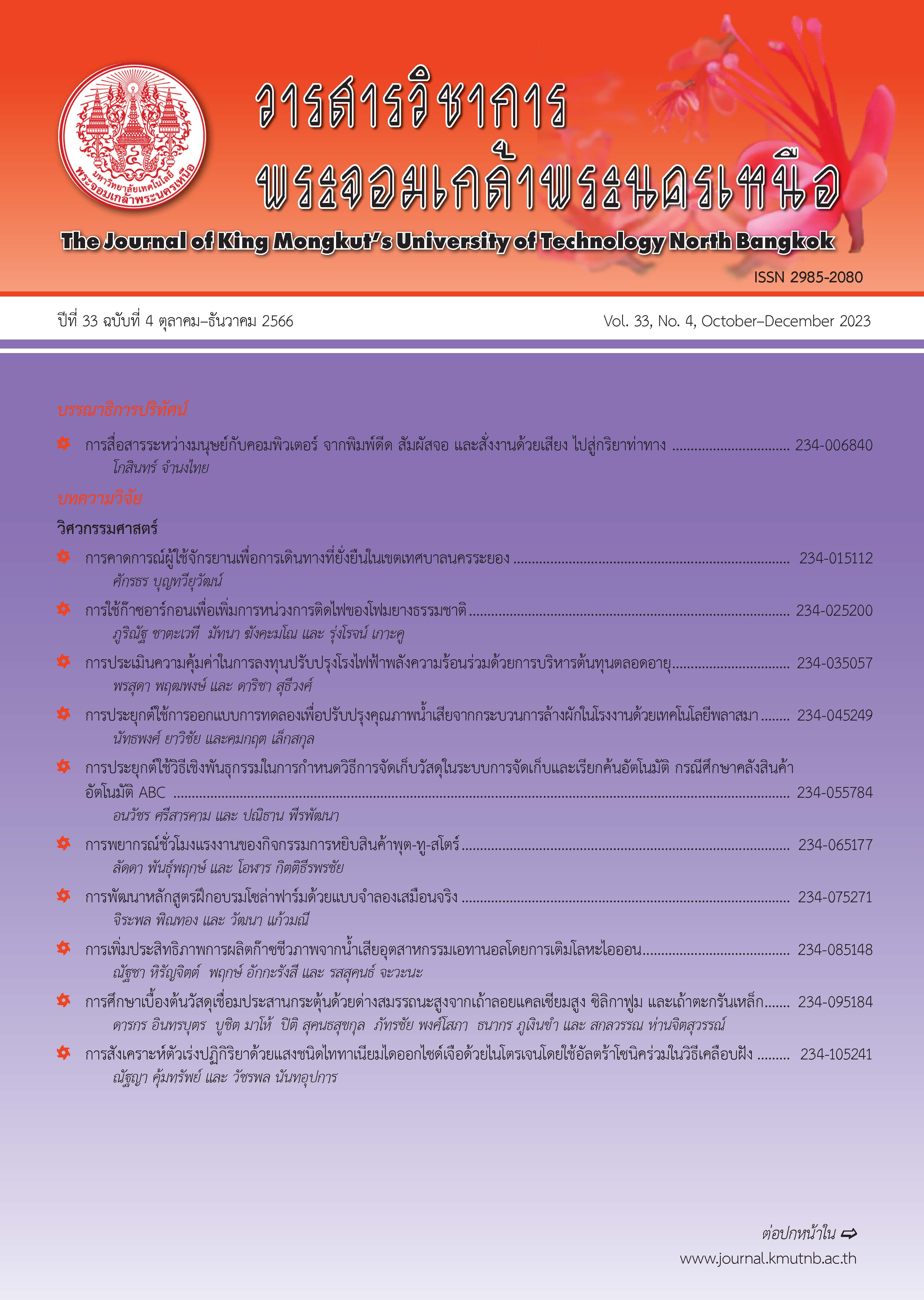การพัฒนาหลักสูตรฝึกอบรมโซล่าฟาร์มด้วยแบบจำลองเสมือนจริง
Main Article Content
บทคัดย่อ
การพัฒนาหลักสูตรฝึกอบรมโซล่าฟาร์มด้วยแบบจำลองเสมือนจริง (VRSF) เป็นการนำเทคโนโลยีเสมือนจริง (Virtual Reality; VR) มาประยุกต์ใช้ในการฝึกอบรมในรูปแบบออนไลน์ เพื่อให้ผู้เข้าอบรมมีประสบการณ์การเรียนรู้เหมือนอยู่ในสถานที่จริง เป็นการช่วยลดค่าใช้จ่ายและสะดวกต่อการเรียนรู้ การวิจัยนี้มีวัตถุประสงค์เพื่อ 1) พัฒนาหลักสูตรฝึกอบรม VRSF 2) ทดสอบประสิทธิภาพของหลักสูตรฝึกอบรม VRSF 3) หาผลสัมฤทธิ์การเรียนรู้ของผู้เข้าอบรมหลักสูตรฝึกอบรม VRSF และ 4) ประเมินความพึงพอใจของผู้เข้าอบรมหลักสูตรฝึกอบรม VRSF กลุ่มตัวอย่างที่ใช้ในการวิจัยนี้ เป็นประชาชนทั่วไป ข้าราชการ ลูกจ้าง พนักงานราชการของโรงงานต้นแบบการวิจัยพัฒนาอาวุธที่มีความสนใจหรือต้องการทำธุรกิจโซล่าฟาร์มและต้องมีความรู้เบื้องต้นเกี่ยวกับการเขียนโปรแกรมคอมพิวเตอร์ จำนวน 50 คน เครื่องมือที่ใช้ในการวิจัยคือ หลักสูตรฝึกอบรม VRSF บนเว็บไซต์ www.vr-solarfarm.com และแบบทดสอบวัดผลสัมฤทธิ์การเรียนรู้ของผู้เข้าอบรม ในรูปแบบ One Group Pre-test Post-test Design ผลการวิจัยพบว่า หลักสูตรฝึกอบรม VRSF มีคุณภาพอยู่ในระดับดีมาก หลักสูตรมีการฝึกเขียนโปรแกรมด้วยระบบสมองกลฝังตัวเพื่อควบคุมแผงโซล่าเซลล์ตามทิศทางดวงอาทิตย์ ทำให้ผู้เข้าอบรมได้รับความรู้เพิ่มเติมและนำไปใช้ประโยชน์ต่อไปได้ ผู้เข้าอบรมมีผลสัมฤทธิ์การเรียนรู้เพิ่มขึ้นมากกว่าร้อยละ 80 และผู้เข้าอบรมมีความพึงพอใจต่อหลักสูตรโดยรวมอยู่ในระดับมาก
Article Details

อนุญาตภายใต้เงื่อนไข Creative Commons Attribution-NonCommercial-NoDerivatives 4.0 International License.
บทความที่ลงตีพิมพ์เป็นข้อคิดเห็นของผู้เขียนเท่านั้น
ผู้เขียนจะต้องเป็นผู้รับผิดชอบต่อผลทางกฎหมายใดๆ ที่อาจเกิดขึ้นจากบทความนั้น
เอกสารอ้างอิง
Ministry of Energy. (2015, June). Thailand power development plan 2015-2036 (PDP2015). Energy Policy and Planning Office. Ministry of Energy. Bangkok, Thailand [Online]. (in Thai). Available: http://www.eppo.go.th/images/ POLICY/PDF/PDP_TH.pdf.
Kasikornbank Research. (2020, March). Business opportunities make money renewable energy. Kasikornbank SME Analysis, Bangkok, Thailand. [Online]. (in Thai). Available: https://www. kasikornbank.com/th/busin ess/sme/KSME Knowledge/article/KSMEAnalysis/Documents/ BusinessOppotunity.pdf.
I. Laoprom and W. Buathes, “Design and construct of solar power systems by solar tracking,” presented at the 3rd Kamphaeng Phet Rajabhat University National Conference, Kamphaeng Pet, Thailand, Dec. 22, 2016 (in Thai).
S. Padoongphan, “Automation control solarcell,” Princess of Narathiwat University Journal, vol. 7, no. 1, pp. 81–91, 2015 (in Thai).
Y. Chee, “Virtual reality in education: Rooting learning in experience,” in Proceedings the International Symposium on Virtual Education 2001, 2001, pp. 43–54.
G. Burdea and P. Coiffet, “Virtual reality technology,” Reviews, vol. 12, no. 6, pp. 663–664, 2003.
M. Sanders, “A rationale for new approaches to STEM education and STEM education graduate programs,” presented at the 93rd Mississippi Valley Technology Teacher Education Conference, Nashville, Davidson, Dec-Jan 2009.
V. Raghunathan, A. Kansal, J. Hsu, J. Friedman, and M. Srivastava,” Design considerations for solar energy harvesting wireless, in Proceedings IPSN 2005, 2005, pp. 457–462.
D. L. Clason and T. J. Dormody, “Analyzing data measured by individual likert-type items,” Journal of Agricultural Education, vol. 35, no. 4, pp. 31–35, 1994.
A. Yadav, D. Subedi, M. A. Lundeberg, and C. F. Bunting, “Problem-based learning: Influence on students' learning in an electrical engineering course,” Journal of Engineering Education, vol. 100, no. 2, pp. 253–280, 2011.

